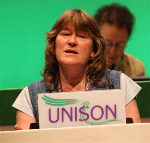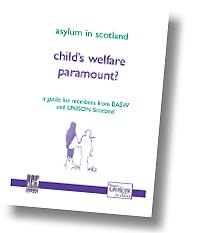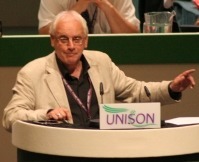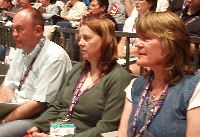Local Government Service Group Conference
15th - 16th June Bournemouth
Conference Report
Branch well represented
in conference debate as emergency motion on fuel costs is heard
Kate Ramsden, Branch Chair and conference delegate took part
in three debates at Local Government Conference including the debate
on rising fuel costs and the impact on our members, heard as a result
of our emergency motion on this issue.
The pay ballots across the UK dominated Conference but issues like
privatisation, shared services, Housing and Social Care all took
centre stage too as did the Emergency composite from our branch
(among others) demanding action on mileage rates to reflect the
huge increase in costs for essential staff.
Call for urgent action on 'devastating
impact' of petrol rises on mileage rates
As a result of our emergency
motion, UNISON will take urgent action to address the devastating
impact that soaring fuel costs is having on members who use their
cars for work. Huge increases in the cost of petrol and diesel mean
that many members are now subsidising their employers.
Delegates heard how branches were receiving distress calls on a
daily basis from members who were in despair at the situation -
members who were already hard hit by the knock-on effect of rising
fuel prices on food and other goods.
The Local Government Service Group Conference gave its overwhelming
backing to an emergency composite from a number of local government
branches and fully supported a range of measures aimed at securing
fair car rates, including starting discussions about withdrawing
the use of vehicles and industrial action.
 Our
emergency motion ensured that the unique Scottish position was reflected
in the debate. Kate Ramsden told conference that we are seeing the
steepest rises in petrol and diesel costs for more than a century
with diesel now costing almost £1.30 a litre. "For our colleagues
on the Scottish Islands you can add 15p to that cost," she said. Our
emergency motion ensured that the unique Scottish position was reflected
in the debate. Kate Ramsden told conference that we are seeing the
steepest rises in petrol and diesel costs for more than a century
with diesel now costing almost £1.30 a litre. "For our colleagues
on the Scottish Islands you can add 15p to that cost," she said.
"In Scotland, there is no longer national bargaining on mileage
rates and the mileage allowance paid by most Scottish local authorities
is the Inland Revenue rate of 40p per mile. "It is a disgrace that
this has not been increased since 2002. Running a car for work now
eats into our members' incomes and is fast becoming a pay cut,"
she said, adding that this hits low paid members the hardest.
She told conference, "Our members, especially those in rural areas
like Aberdeenshire, need their cars to do their jobs. They donít
have a choice. They need their cars to make sure that vital services
are provided to the most vulnerable in our society. Services like
home care for the elderly and disabled Ė a lifeline in rural communities,
but provided by some of our lowest paid members. Services like social
work services to protect vulnerable children and to support families
in need.
"We need action as a matter of urgency," she said, calling on the
Service Group Executive to redouble its efforts to campaign for
an increase in the Inland Revenue rate, and to put pressure on the
government to address the fuel crisis and to check the spiral of
rising costs.
index
Welfare of all children must be paramount,
regardless of immigration status
UNISON's local government conference built on a motion from Scotland
last year, and agreed overwhelmingly to keep up the campaign for
children to be seen as children first with their immigration status
second.
 The
law intended all children's interests to be 'paramount'. UNISON
will continue to campaign for that, it will support members trying
to work within that principle and will continue to challenge policy
and practice which does not comply. The
law intended all children's interests to be 'paramount'. UNISON
will continue to campaign for that, it will support members trying
to work within that principle and will continue to challenge policy
and practice which does not comply.
It will press for properly funded services for asylum seeker children
who are unaccompanied and will support campaigns against their enforced
removal.
Supporting the motion, Kate Ramsden. Branch Chair, spoke of her
concerns about the Home Office guidance on unaccompanied asylum
seeker children.
"Although it purports to have a child welfare focus, it is not based
on the principle that care planning for these children should be
based on an assessment of their needs as with any otherchild. Rather
it creates a significant move away from this by requiring social
work and other staff to take account of immigration processes in
the care planning for these children. This discriminates against
these young people who are amongst our most vulnerable."
Kate praised UNISON's stance on asylum issues, especially our clear
position that the child's welfare is paramount, regardless of immigration
status.
"We need to ensure that our members who work with these vulnerable
children are properly supported to make sure that our progressive
domestic laws, whether in Scotland or across the UK, apply equally
to these children and that this informs our practice.
"Let's challenge an immigration system that would further undermine
their rights."
index
Two conference plan rejected as Scotland teamwork
wins debate
Finally, Kate had a key role as Scotland led opposition to a plan
to split Local Government Conference from National Conference and
won a surprise victory.
Scotland's teamwork and old-fashioned debating skills combined
to win the shock rejection of a motion to detach Local Government
Conference from National Conference and move it to April alongside
the Health Conference.
It looked like there was a huge majority of England and Wales branches
supporting the motion until the last minute when many changed their
view in light of arguments made by Scotland in the debate.
It has been a long time since a debate created such a shift and
the motion was beaten by 6,000 in a card vote.
While there are good arguments for closer working between Local
Government and Health, especially with shared services, the motion
dwelt more on specious arguments that the change would suit people
with caring responsibilities and give the conference a higher profile.
 John
Stevenson, City if Edinburgh, exploding one argument for change
said, "It is not WHEN local government conference is held that gives
it a profile - it is HOW it is held. It is about the profile WE
give it and it is about the issues WE bring to it. "If we do want
a better profile, why are we piggy-backing on the health conference?
Surely we don't need a conference so we can talk and work with our
health colleagues?" John
Stevenson, City if Edinburgh, exploding one argument for change
said, "It is not WHEN local government conference is held that gives
it a profile - it is HOW it is held. It is about the profile WE
give it and it is about the issues WE bring to it. "If we do want
a better profile, why are we piggy-backing on the health conference?
Surely we don't need a conference so we can talk and work with our
health colleagues?"
John added that although the motion mentions, not once but twice,
the benefits for those with caring responsibilities, this is a bit
of a smokescreen for most delegates. For many, two separate conferences
will mean 10 not 7 days away from home.
"Add to that the fact that we have a host of public holidays in
April across Scotland, as well as our annual Regional and Local
Government Conferences and we have the Scottish Trades Union Congress.
Another Conference in April won't help when it comes to care arrangements."
"We also need to wake up to the reality of devolution in our countries
and the reality of a devolution agenda in our own union," warned
John. "With the key service conditions decisions being taken in
devolved bargaining and legal structures, you could see why delegates
may not see a UK wide conference separated from Delegate Conference
as all that relevant and that could affect attendance."
Kate spoke of the additional demands of travel for branches at
a distance from conference venues.
"A two day conference for those of us in remote parts of Scotland
will become four days away from home," she said, adding that if
this motion is passed there is a real risk that branches in Scotland
will find it harder to find delegates willing and able to come -
especially smaller branches with a smaller pool of activists.
And responding to a previous speaker who referred to a motion passed
earlier, that pay claims in England and Wales should be timetabled
to ensure that any industrial action will start no later than April,
Kate challenged, "Why would you want to be trotting down to a conference
in April anyway? Shouldn't you be in your branches co-ordinating
and supporting the industrial action?"
The themes of travel and the impact of that on care arrangements
for those with dependants was further emphasised by Sandra Kennie
of East Lothian branch, herself a carer for an adult dependant.
"My main concern is to make sure there is as little possible disruption
to the dependant I have left at home," she told delegates, adding
that her current absence of 7 days would increase to 10 days of
disruption.
She also spoke of her concerns that if smaller branches find themselves
unable to send delegates to two separate conferences, their funding
will be reduced because they haven't attended their national service
group conference.
All the Scottish speakers called on the Service Group executive
to think again and on a card vote, conference sent them to do just
that!
index
Other key issues
 School
meals: Scotland's Carol Ball spoke on the effects of staff due
to school meals changes. School
meals: Scotland's Carol Ball spoke on the effects of staff due
to school meals changes.
Housing: Conference has pledged to continue to defend council
housing, and to carry on fighting for decent housing for all. Delegates
welcomed the government's commitment to building new houses, but
determined to make sure they were council-owned - because "housing
belongs in local authorities."
Social Care: Conference tackled the issue of Home Care privatisation
and the possible hiving off of Looked After Children services in
England.
Click
here for UNISON Scotland Local Government Conference reports.
index
National service group executives and conferences
Service group conferences bring together members across the country
doing similar kinds of jobs or working for the same kinds of employers.
This branch's service group is local government. It has its conference
at the start of the National Conference.
Branches, along with Regions, self organised groups and the Service
Group Executive (SGE) can put forward motions to be debated at conference
or can amend motions which have been submitted. As delegates we
will vote on the motions in line with branch policy, where we have
that in place. We can also speak for or against the motions and
amendments and branch delegates have a good record of participating
in debates at this conference. (See the 2006/07 conference reports.)
This year our branch has submitted an
emergency motion to Local Government Conference on rising fuel
costs and the impact on our members who need to use their cars on
council business.
This motion was approved at a Branch Committee on 5th June and
is in line with our branch policy to campaign for an increase in
the mileage rate. We believe this is even more critical at a time
when the cost of diesel and petrol has been rising alarmingly over
the past month.
To see
the motion click here.
This branch's delegates for this year's conference are:
 |
 |
 |
 |
|
Ian McDonald
|
Kate Ramsden
|
Tricia Morrison
|
Maureen Grady
|
Branch members can stand for election to the local government service
group executive (the elected body which runs the service group in
UNISON). Bob Revie, Branch Secretary is a member of the service
group executive, elected by the Scottish Local Government Committee.
top
|


 Our
emergency motion ensured that the unique Scottish position was reflected
in the debate. Kate Ramsden told conference that we are seeing the
steepest rises in petrol and diesel costs for more than a century
with diesel now costing almost £1.30 a litre. "For our colleagues
on the Scottish Islands you can add 15p to that cost," she said.
Our
emergency motion ensured that the unique Scottish position was reflected
in the debate. Kate Ramsden told conference that we are seeing the
steepest rises in petrol and diesel costs for more than a century
with diesel now costing almost £1.30 a litre. "For our colleagues
on the Scottish Islands you can add 15p to that cost," she said.
 The
law intended all children's interests to be 'paramount'. UNISON
will continue to campaign for that, it will support members trying
to work within that principle and will continue to challenge policy
and practice which does not comply.
The
law intended all children's interests to be 'paramount'. UNISON
will continue to campaign for that, it will support members trying
to work within that principle and will continue to challenge policy
and practice which does not comply.  John
Stevenson, City if Edinburgh, exploding one argument for change
said, "It is not WHEN local government conference is held that gives
it a profile - it is HOW it is held. It is about the profile WE
give it and it is about the issues WE bring to it. "If we do want
a better profile, why are we piggy-backing on the health conference?
Surely we don't need a conference so we can talk and work with our
health colleagues?"
John
Stevenson, City if Edinburgh, exploding one argument for change
said, "It is not WHEN local government conference is held that gives
it a profile - it is HOW it is held. It is about the profile WE
give it and it is about the issues WE bring to it. "If we do want
a better profile, why are we piggy-backing on the health conference?
Surely we don't need a conference so we can talk and work with our
health colleagues?"  School
meals: Scotland's Carol Ball spoke on the effects of staff due
to school meals changes.
School
meals: Scotland's Carol Ball spoke on the effects of staff due
to school meals changes. 


